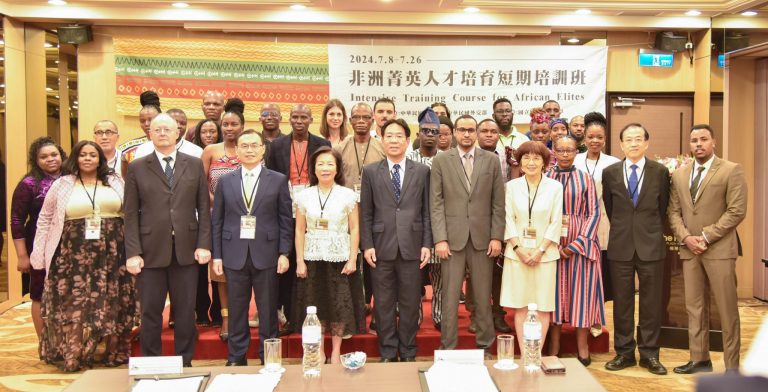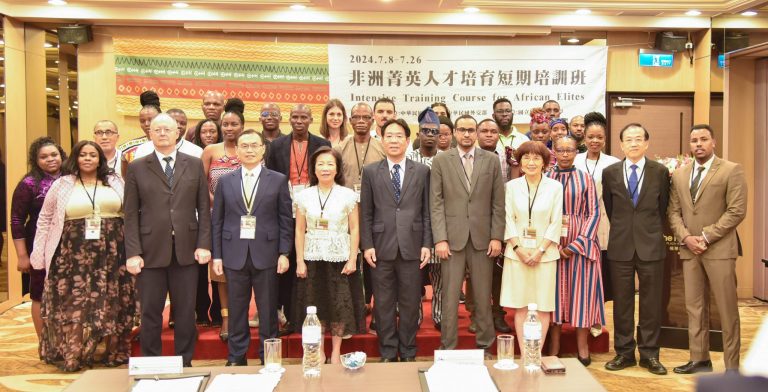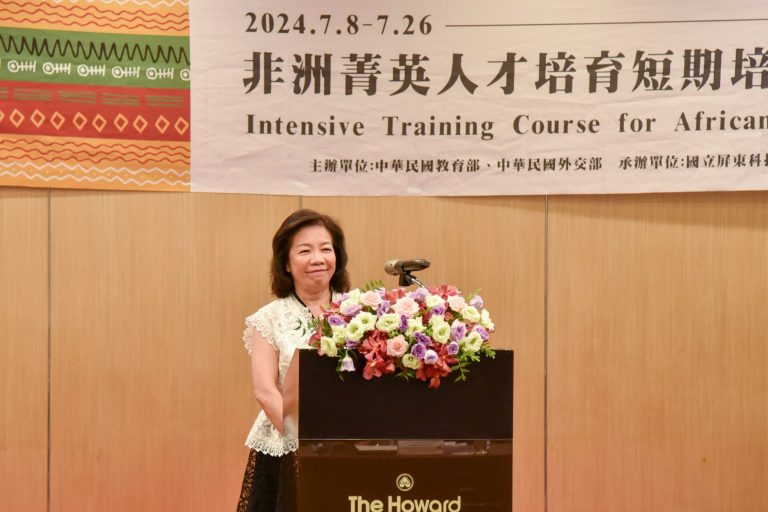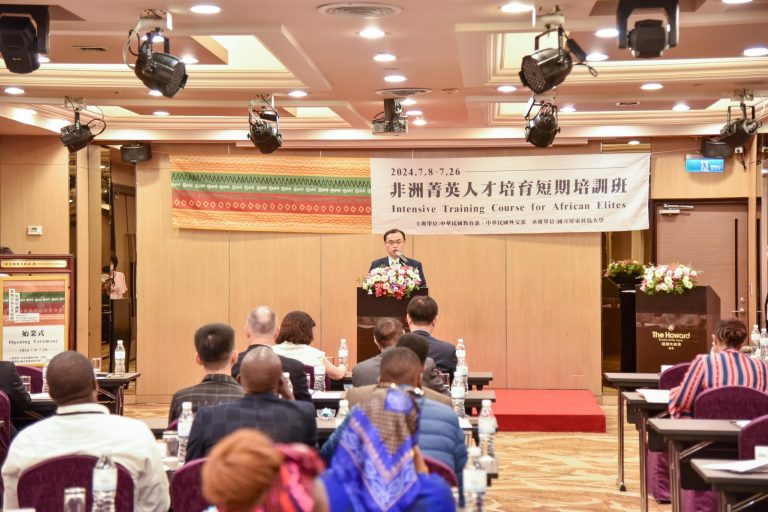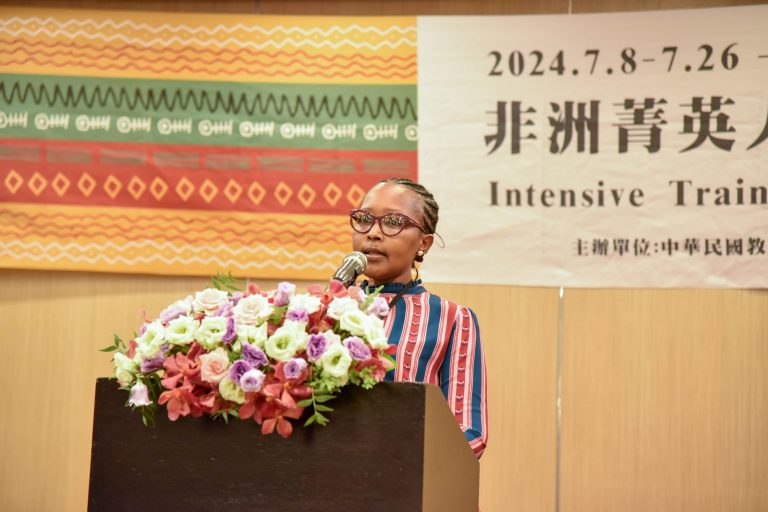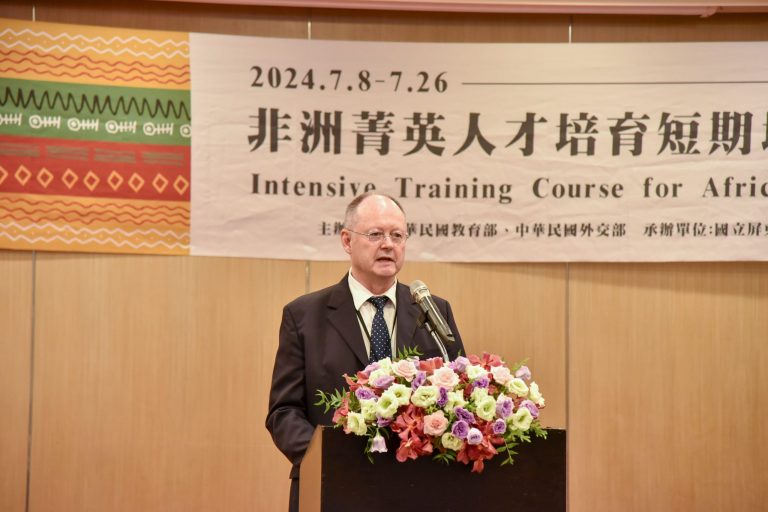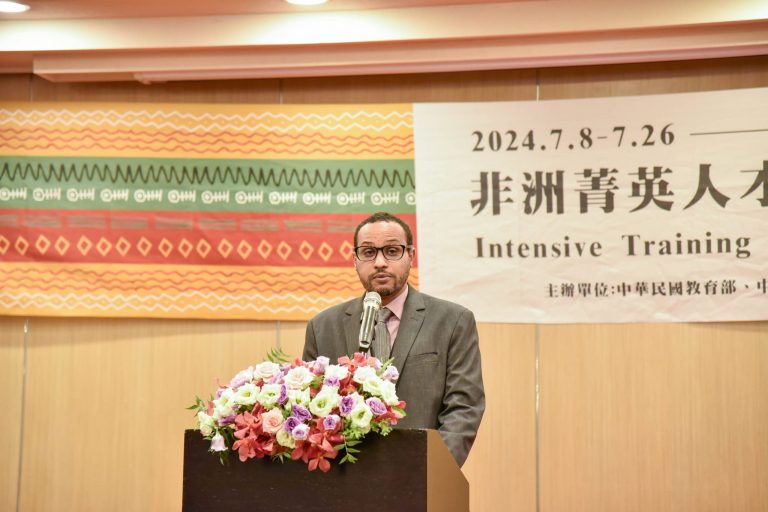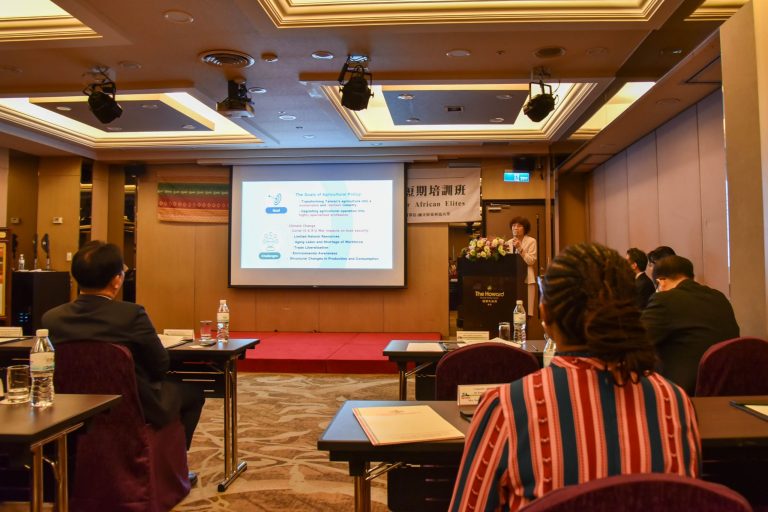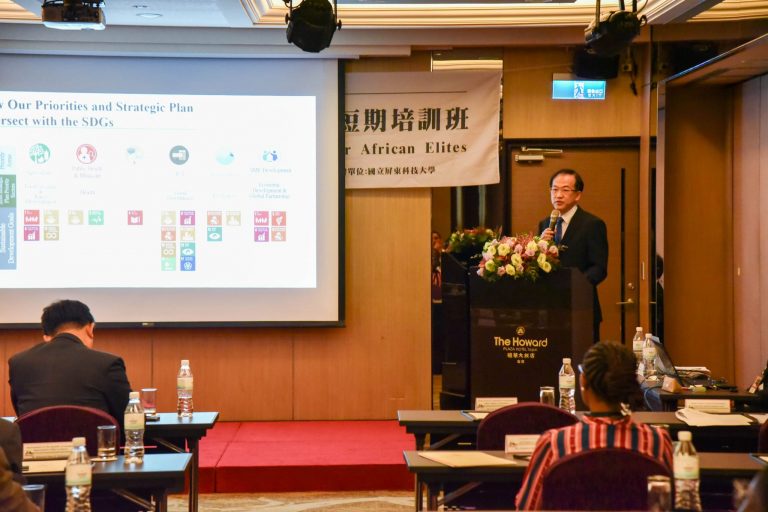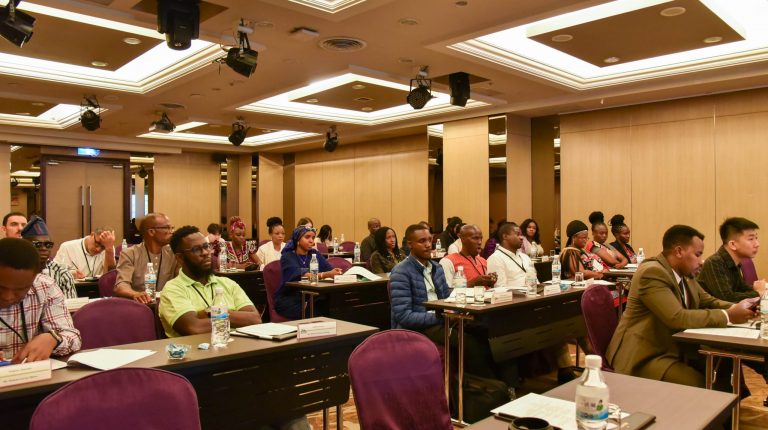The Intensive Training Course for African Elites was new launched last year with great acclaim, and in light of its success, the Ministry of Education and the Ministry of Foreign Affairs chose to sponsor it once again this year. The grand opening ceremony for the program was held on July 8th at 10:00 am at the Howard Plaza Hotel in Taipei. A number of dignitaries were present at the ceremony to jointly mark the occasion, including Yang Yu-hui, Director General of the Department of Technological and Vocational Education at the Ministry of Education; Anthony Chung-Yi Ho, Director-General, Department of West Asian and African Affairs; Dr. Grace Lih-Fang Lin, Director-General, Department of International Affairs, Ministry of Agriculture; Deputy Secretary General Stephen J. H. Lee of Taiwan ICDF; President Chin-Lung Chang of National Pingtung University of Science and Technology; Counselor Mrs. Nontokozo Shongwe-Tsabedze of the Eswatini Embassy in Taiwan; Somaliland Representative to Taiwan Mr. Mohamed Omar H. Mohamoud; and Representative Mr. Hugh Graham Anderson of the Liaison Office of South Africa.
At the ceremony, keynote speeches were provided by the Ministry of Agriculture and the Taiwan ICDF on the topics of “Taiwan-Africa Agricultural Cooperation” and the “ICDF’s Ongoing Projects in Africa” .
Director General Yang Yu-hui of the Department of Technological and Vocational Education warmly welcomed the students from Africa, saying “by participating in this training course you will get familiar with Taiwan’s learning environment and the features of its talent cultivation in the field agricultural field. You will also get to learn about the industrial development and agricultural industry-university cooperation taking place here, and witness the technological and sustainable development achievements of Taiwan’s agricultural sector. We expect that the trainees will be able to bring the skills and experiences acquired in Taiwan back to their home countries and use them to help improve the agricultural and animal husbandry production there. In the future, you will be able to serve as a communication and cooperation bridges connecting Taiwan’s local technical delegations with farmers in your local areas.”
Anthony Chung-Yi Ho, Director-General of the Department of West Asian and African Affairs expressed that “Africa is a land full of opportunities, and Taiwan attaches great importance to its cooperation with her. Africa’s population will increase to 2.5 billion by 2050, meaning 1 in every 4 people in the world will be from Africa. Taiwan has a comprehensive semiconductor industry and is also an important producer of information and communications hardware. It also plays a pivotal role in the fields of smart technologies, e-commerce and next-generation communications, and has great potential to further expand exchange and cooperation with Africa.”
National Pingtung University of Science and Technology’s president, Chin-Lung Chang, thanked the Ministry of Foreign Affairs, Ministry of Education and all the ambassadors and representatives for their efforts, saying “I believe, in addition to acquiring knowledge and skills in agriculture, the students participating in this program will have the opportunity to experience Taiwan’s culture and cuisine. The most important thing is that they enjoy their studies and life experiences while here in Taiwan.”
NPUST has cultivated many agricultural professionals over the years and participated in numerous national diplomatic programs designed to help friendly countries improve agricultural technology and production management. With a solid foundation in scientific and technological agriculture, this newly established program is focused on the actual needs of the agriculture and animal husbandry industries in Africa. Instruction will be provided on the friendly agricultural methods and sustainable management strategies developed by NPUST in recent years, and include professional courses on soil health and fertilization, animal and plant production management, pest and disease control, livestock house planning and more.
Participants in this year’s program come from eight African countries, including the Kingdom of Eswatini, Tanzania, Kenya, the Republic of Somaliland, the Republic of South Africa, Namibia, Nigeria, and Libya. Twenty-five in total, the trainees include self-employed entrepreneurs, farm owners, agricultural officials, extension personnel, and full time students. The training period lasts for three weeks, beginning July 8th and ending on the 26th (2024). Taiwan and NPUST look forward to developing new friendships through the program and to seeing the trainees gain valuable skills and experiences which they can bring home and put into practice.
At the ceremony, keynote speeches were provided by the Ministry of Agriculture and the Taiwan ICDF on the topics of “Taiwan-Africa Agricultural Cooperation” and the “ICDF’s Ongoing Projects in Africa” .
Director General Yang Yu-hui of the Department of Technological and Vocational Education warmly welcomed the students from Africa, saying “by participating in this training course you will get familiar with Taiwan’s learning environment and the features of its talent cultivation in the field agricultural field. You will also get to learn about the industrial development and agricultural industry-university cooperation taking place here, and witness the technological and sustainable development achievements of Taiwan’s agricultural sector. We expect that the trainees will be able to bring the skills and experiences acquired in Taiwan back to their home countries and use them to help improve the agricultural and animal husbandry production there. In the future, you will be able to serve as a communication and cooperation bridges connecting Taiwan’s local technical delegations with farmers in your local areas.”
Anthony Chung-Yi Ho, Director-General of the Department of West Asian and African Affairs expressed that “Africa is a land full of opportunities, and Taiwan attaches great importance to its cooperation with her. Africa’s population will increase to 2.5 billion by 2050, meaning 1 in every 4 people in the world will be from Africa. Taiwan has a comprehensive semiconductor industry and is also an important producer of information and communications hardware. It also plays a pivotal role in the fields of smart technologies, e-commerce and next-generation communications, and has great potential to further expand exchange and cooperation with Africa.”
National Pingtung University of Science and Technology’s president, Chin-Lung Chang, thanked the Ministry of Foreign Affairs, Ministry of Education and all the ambassadors and representatives for their efforts, saying “I believe, in addition to acquiring knowledge and skills in agriculture, the students participating in this program will have the opportunity to experience Taiwan’s culture and cuisine. The most important thing is that they enjoy their studies and life experiences while here in Taiwan.”
NPUST has cultivated many agricultural professionals over the years and participated in numerous national diplomatic programs designed to help friendly countries improve agricultural technology and production management. With a solid foundation in scientific and technological agriculture, this newly established program is focused on the actual needs of the agriculture and animal husbandry industries in Africa. Instruction will be provided on the friendly agricultural methods and sustainable management strategies developed by NPUST in recent years, and include professional courses on soil health and fertilization, animal and plant production management, pest and disease control, livestock house planning and more.
Participants in this year’s program come from eight African countries, including the Kingdom of Eswatini, Tanzania, Kenya, the Republic of Somaliland, the Republic of South Africa, Namibia, Nigeria, and Libya. Twenty-five in total, the trainees include self-employed entrepreneurs, farm owners, agricultural officials, extension personnel, and full time students. The training period lasts for three weeks, beginning July 8th and ending on the 26th (2024). Taiwan and NPUST look forward to developing new friendships through the program and to seeing the trainees gain valuable skills and experiences which they can bring home and put into practice.

